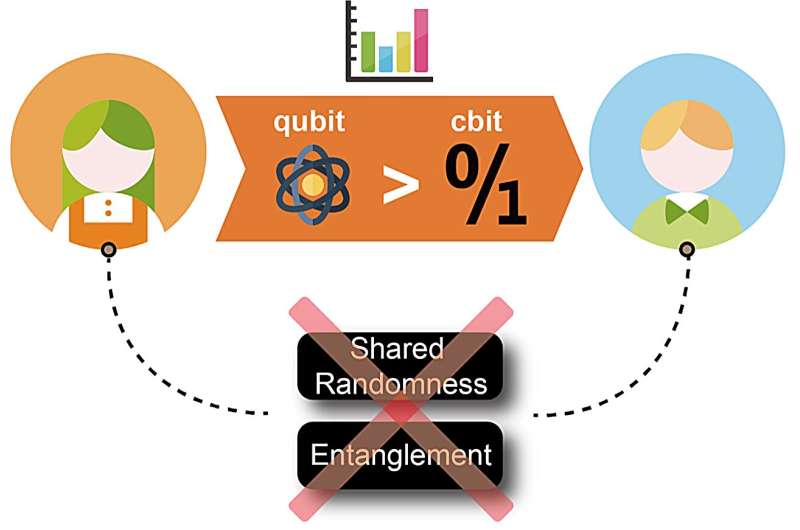
December 2, 2024 by Ingrid Fadelli , Phys.org
Collected at: https://phys.org/news/2024-11-quantum-advantage-storage-photonic-processor.html
In recent years, quantum physicists and engineers have been trying to develop quantum computer processors that perform better than classical computers on some tasks. Yet conclusive demonstrations proving that quantum systems perform better than their classical counterparts (i.e., realizations of a quantum advantage) remain scarce, due to various experimental challenges.
Researchers at Henan Key Laboratory of Quantum Information and Cryptography and the S. N. Bose National Center for Basic Sciences carried out an experiment aimed at establishing the quantum advantage of an elementary quantum system for information storage.
Their paper, published in Physical Review Letters, demonstrates that a single qubit can outperform a classical bit in a communication task that does not involve any shared randomness (i.e., classically correlated random variables between communicating parties).
“Quantum advantages are challenging to identify, even harder to demonstrate experimentally, and often constrained by fundamental no-go theorems,” Heliang Huang, senior author of the paper, told Phys.org.
“For example, the Holevo and Frenkel-Weiner results equate the utility of a qubit (a two-level quantum system) to that of a classical bit for any classical communication task involving a single sender (Alice) and a single receiver (Bob). While these theorems impose strict limits on the capabilities of quantum resources, they assume the availability of pre-shared classical correlations between the sender and receiver—a resource that is itself costly from an information-theoretic perspective.”
The experiment carried out by Huang and his colleagues was aimed at determining whether a qubit can outperform a classical bit in the absence of classical shared randomness, specifically on a classical data storage task. Their findings show that this is the case, which could prompt researchers to re-evaluate the potential of quantum systems in realistic scenarios where resources are more constrained.
“More broadly, our study contributes to the ongoing pursuit of understanding and leveraging the nonclassical properties of quantum systems for tasks that exceed classical limits,” said Manik Banik, another senior author of the paper. “It represents a significant step toward unlocking the transformative potential of quantum technologies in information processing and communication.”
To realize the quantum advantage outlined in their paper, the researchers carried out a series of experiments on a photonic quantum processor. To conduct these experiments, they first developed a variational triangular polarimeter, an optical instrument that can precisely measure the polarization of light.
Using this instrument, they were able to collect positive operator value measurements (POVM) on photons. These measurements are essential for understanding quantum states in the presence of constraints such as noise.
“Our experiment involved encoding information onto quantum states (qubits) and transmitting them from one agent to another (i.e., from Alice to Bob), who then decoded the information using our custom-built polarimeter,” explained Huang.
“We played a game-theoretic scenario known as the ‘restaurant game,’ where Bob had to choose a restaurant to visit based on the quantum information received, without visiting a closed restaurant.”
The experiment carried out by these researchers yielded interesting results, as they suggest that a single qubit can in fact outperform a classical bit in this communication task with no shared randomness. Notably, this finding is a significant departure from well-established no-go theorems (i.e., results that placed limits on what can and cannot be achieved in the context of quantum theory).
“Our study has implications for near-term quantum technologies, providing a semi-device-independent certification scheme for quantum encoding-decoding systems and an efficient method for information loading and transmission in quantum networks,” said Huang.
“It also suggests that quantum systems could be used to enhance data storage and communication in scenarios where shared randomness is not available or is compromised.”
The results gathered by Huang and his colleagues could inspire re-evaluations of the potential of elementary quantum computing systems and their performance compared to that of classical computers. In their next studies, the researchers plan to explore the quantum advantage of larger systems, specifically focusing on enhancing the scalability and effectiveness of their experimental setup.
“We are particularly interested in extending our findings to multi-party quantum computing, quantum cryptography and quantum communication protocols, with the goal of providing a foundation for large-scale quantum networks,” said Huang. “The ability to store and transmit quantum information efficiently is key to realizing these networks, and our work is a step towards that goal.”
In addition to conducting further experiments with larger quantum systems, the researchers plan to explore theoretical aspects of quantum computing systems. For instance, they would like to better delineate the theoretical underpinnings of quantum advantage and determine how these can be leveraged in experimental settings.
“This includes studying the interplay between quantum resources, such as entanglement and nonlocality, and their role in enhancing classical data storage and processing capabilities,” added Huang. “Our ultimate aim is to not only to push the boundaries of quantum technology but also to make these advancements accessible and beneficial for real-world applications.”
More information: Chen Ding et al, Quantum Advantage: A Single Qubit’s Experimental Edge in Classical Data Storage, Physical Review Letters (2024). DOI: 10.1103/PhysRevLett.133.200201. On arXiv : DOI: 10.48550/arxiv.2403.02659
Journal information: Physical Review Letters , arXiv

Leave a Reply